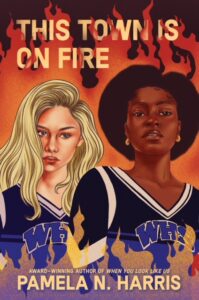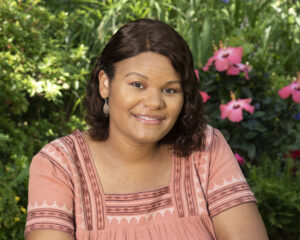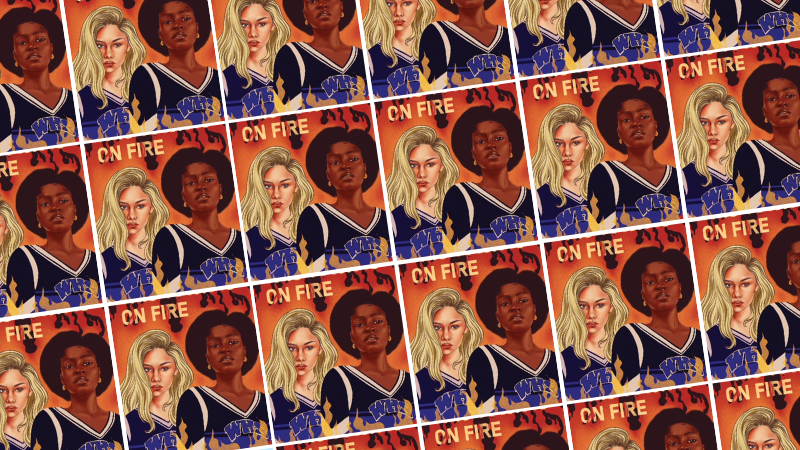“[Naomi’s] voice and her convictions are clear. Her growth from passivity to activism to realizing some hard truths about growing up is especially striking, amid other outstanding characterizations.” — ALA Booklist (starred review)
 WILLIAMSBURG, Virginia – Pamela N. Harris, award winning author of “When You Look Like Us” returns with the release of “This Town Is On Fire” (June 20, 2023, HarperCollins/Quill Tree Books). Sharply written, this YA thriller tells the story of what happens when the latest internet “Karen” happens to be your best friend.
WILLIAMSBURG, Virginia – Pamela N. Harris, award winning author of “When You Look Like Us” returns with the release of “This Town Is On Fire” (June 20, 2023, HarperCollins/Quill Tree Books). Sharply written, this YA thriller tells the story of what happens when the latest internet “Karen” happens to be your best friend.
A lot is up in the air in Naomi Henry’s life: her spot as a varsity cheer flier, her classmates’ reaction to the debut of her natural hair and her crush on the guy who’s always been like a brother to her. With so much uncertainty, she feels lucky to have a best friend like Kylie to keep her grounded. After all, they’re practically sisters — Naomi’s mom took care of Kylie and her twin brother for years.
But then a video of Kylie calling the cops on two Black teens in a shopping store parking lot goes viral. Naomi is shaken, and her town is reeling from the publicity. While Naomi tries to reckon with Kylie, the other Black students in their high school are questioning their friendship, and her former friends are wondering where this new “woke” Naomi came from. Although Naomi wants to stand by her best friend, she now can’t help but see everything in a different light.
As tensions in her town escalate, Naomi finds herself engaging in protests that are on the cusp of being illegal. And then a bomb explodes, and someone is found dead. Will Naomi be caught in the center of the blast?
Golden Kite Award winner Harris has crafted a taut novel that delves into big issues, and is the perfect next read for fans of “I’m Not Dying with You Tonight” and “The Black Kids.”
Advanced praise for “This Town Is On Fire”
“By highlighting issues of economic disparity, racism, and white privilege, Harris weaves a nuanced social narrative in which a Black teenager is forced to reckon with her white best friend’s racist actions. Complex.” — Publishers Weekly
“A critical approach to coming-of-age into Black adolescence. Explosive.” — Kirkus Reviews
‘Nuanced and realistic. An important addition to high school and teen collections; hand to readers who have read I’m Not Dying with You Tonight by Kimberly Jones and Gilly Segal, The Black Kids by Christina Hammonds Reed, and Chlorine Sky by Mahogany L. Browne.’ — School Library Journal
Praise for “When You Look Like Us”
“A high-speed story that will draw teens in and keep them turning pages until they reach the unpredictable and thrilling ending. A must for YA collections.” — School Library Journal (starred review)
“A powerful story about misperceptions, reality, and the lives lived in between.” — Kirkus Reviews (starred review)
“[A] poignant debut novel. Harris creates a vividly drawn world, a rich cast of characters, and an authentic neighborhood.” — Booklist
“Harris unapologetically gives voice to the grief that a community can feel when the law fails them, as well as their need to, instead, rely on the hope, love, and power they bring to one another. The strength and endurance of the Black family reverberate throughout this achingly honest debut.” — Publishers Weekly
“This Town is On Fire”
Pamela N. Harris | June 20, 2023 | HarperCollins/Quill Tree Books | YA Thiller/Mystery
Ebook, 9780063212640, $7.99 | Hardcover, 9780063212626, $19.99
 PAMELA N. HARRIS was born and somewhat raised in Newport News, Virginia — also affectionately known as “Bad News.” A former school counselor by day, she received her BA in English and a master’s in school counseling at Old Dominion University, her MFA in creative writing at Fairleigh Dickinson University, and a Ph.D. in counselor education and supervision at William and Mary. When she isn’t writing, Harris is re-watching Leonardo DiCaprio movies, playing with her two kiddos and pretending to enjoy exercising.
PAMELA N. HARRIS was born and somewhat raised in Newport News, Virginia — also affectionately known as “Bad News.” A former school counselor by day, she received her BA in English and a master’s in school counseling at Old Dominion University, her MFA in creative writing at Fairleigh Dickinson University, and a Ph.D. in counselor education and supervision at William and Mary. When she isn’t writing, Harris is re-watching Leonardo DiCaprio movies, playing with her two kiddos and pretending to enjoy exercising.
“When You Look Like Us,” an Odyssey Award winner for Excellence in Audiobook Production for Young Adults, as well as a finalist for SCBWI’s Golden Kite Award for Young Adult Fiction, an NAACP Image Award nominee (2022) for Outstanding Literary Work: Youth/Teens, and a 2022 Edgar Award nominee for Best Young Adult novel, is Harris’ debut novel. Harris’ second young adult novel, “This Town is on Fire,” is out now. She lives in Williamsburg, Virginia. Find out more about her at pamharriswrites.com.
Follow Pamela Harris on social media:
Instagram: @pamharriswrites | Threads: @pamharriswrites
In an interview, Pamela Harris can discuss:
- How viral videos during the pandemic inspired the plot for the story
- Harris’ background as a school counselor and her desire to understand how scandal would affect her students and their friendships
- The consequences of viral moments, particularly the exposure of casual racism and its ripple effects on personal relationships and community dynamics
- The intersection of friendship and privilege as Naomi navigates her friendship with Kylie while grappling with the implications of White privilege and systemic racism
- Naomi’s coming-of-age story in a racially charged climate, her place in a polarized community, and how that reflects the complexities of growing up as a Black teenager in America today
- The novel’s unflinching look at economic disparity, White privilege and allyship
- How the book will appeal to fans of contemporary YA with social impact themes like “I’m Not Dying with You Tonight” by Kimberly Jones and Gilly Segal or “The Black Kids” by Christina Hammonds Reed
An interview with Pamela Harris
1. Where did you get the idea for the novel?
“This Town is on Fire” came to me during the pandemic. Like most of us, I was stuck at home and exposed to a lot of social media that illustrated some of the racial tension in the U.S. This was the rise of the “Karens” — or White women who tended to call the cops on Black individuals for doing everyday things while Black, such as grilling, birdwatching or camping. As I watched these viral videos, I asked myself: What would I do if I were a teen and my White best friend became the next viral “Karen”?
2. How did your work as a school counselor influence the story?
For seven years, I worked as a school counselor in a small rural county in Virginia. The dynamics between the school and community fascinated me. Everyone was super close-knit, and I had to earn their trust before I was accepted. Even more fascinating were the subtle (and sometimes blatant) displays of racism that didn’t seem to shock or bother the Black people who lived there. I just knew I had to write about this juxtaposition, as I’m sure it exists within other communities as well.
3. How did you create your characters Naomi and Kylie?
As a former military brat, I was often the new girl in school. I’ve always noticed that White girls would befriend me quicker than the Black girls — and once I became friends with the former group, the Black kids mostly left me alone. It was almost as though I had chosen a side. Eventually, I was able to establish friendships with peers from all kinds of backgrounds, but that initial isolation always stung. I wanted to explore this with Naomi and Kylie, two best friends who grew up as sisters despite their racial differences. This dynamic is especially poignant now in today’s social climate.
4. Do you think it’s possible to have healthy relationships outside your race/ethnicity?
It’s absolutely possible to have healthy relationships outside your race! The key, however, is to not ignore race. In doing that, you’re denying a huge part of your identities. A true friend will allow you to ask the tough questions and share your authentic feelings about race, while also not taking on the burden of educating each other about your identities.
5. How do you think young readers can advocate for what they believe in?
I’d love young readers to know that advocacy can happen at different levels. I’ve noticed that even with my graduate students, they hear the word, “advocacy” and shrink — thinking it’s a huge task that involves protesting and speaking to politicians. Sure, advocacy can look like that, but it can also occur on more micro or intimate levels. Advocacy can be speaking up for a friend, or holding space for your friend to speak up for themselves. Figure out what your strengths are and determine how you can integrate them into your form of advocacy.
6. What are you working on next?
I’m super excited about my next YA novel, which will be releasing in fall 2025. It’s called “Through Our Teeth,” and it’s slightly different from my first two novels. There’s way more dead bodies, and it has more thriller elements. However, there’s also a subtle social justice message weaved in — this time related to stereotypes dealing with mental health.

A former award-winning journalist with national exposure, Marissa now oversees the day-to-day operation of the Books Forward author branding and book marketing firm, along with our indie publishing support sister company Books Fluent.
Born and bred in Louisiana, currently living in New Orleans, she has lived and developed a strong base for our company and authors in Chicago and Nashville. Her journalism work has appeared in USA Today, National Geographic and other major publications. She is now interviewed by media on best practices for book marketing.


